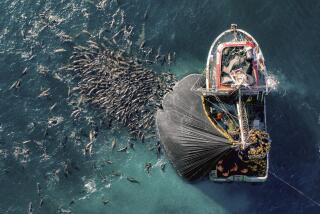TV REVIEW : ‘The First Eden’ Points the Finger at Nature’s Adam
- Share via
“The First Eden” is as different from TV’s cops-and-criminals shows as any program could be, but it still has a villain as insidious as any on “Miami Vice.” That element may not be so apparent in tonight’s hourlong premiere of David Attenborough’s newest urbane, thought-provoking PBS series (8 p.m. on Channels 15 and 28, and 9 p.m. on Channels 24 and 50), but the three parts that follow make it clear who the villain is.
It’s you.
And me, and our ancestors. It’s mankind--which has, in Attenborough’s words, treated the lands around the Mediterranean (the subject of the four-part series) as “little more than a larder that could be raided with impunity.”
The host and writer of “Life on Earth” and “The Living Planet” this time subtly shows how humans have blighted the Mediterranean world, despite also building such glories along its coasts as Athens and Venice. Inhabitants failed to conserve farmlands, turning them into deserts. They murdered their own kind.
But Attenborough’s biggest beef, so to speak, is over the way his own species has mistreated animals. People, he asserts, have lost their reverence for both fauna and flora, and in the process have lost something essential in themselves.
In his British upper-class accent and arm-waving style, Attenborough explains how that situation represents the swing of a pendulum. Mankind went from worshiping animals to employing them and even tormenting them. Chief illustration: the bull--once one of the supreme gods of the region, now brutally and openly tortured and killed in Spain.
Attenborough does not make these points with great anger or even explicitness. Most of his comments and most of the gorgeously filmed segments deal with what he sees as the true glories of the region--the sea’s fascinating evolution (it once dried up and then was filled back up by waterfalls 10 times higher than Niagara) and its myriad plants and animals, from the migrating flamingos of the Mediterranean’s western lands to the Arabian horses at its eastern stretches.
Though “Eden” hops back and forth between history, botany, geology and zoology, its transitions are smooth and sensible--and this nonlinear approach is one of the things that keeps the program from being predictable and plodding. Another thing, of course, is Attenborough’s enthusiasm for the subject. It’s an enthusiasm that’s perhaps a bit too dignified--his series lack humor--but vibrant enough to keep the viewer involved.
More to Read
The complete guide to home viewing
Get Screen Gab for everything about the TV shows and streaming movies everyone’s talking about.
You may occasionally receive promotional content from the Los Angeles Times.






